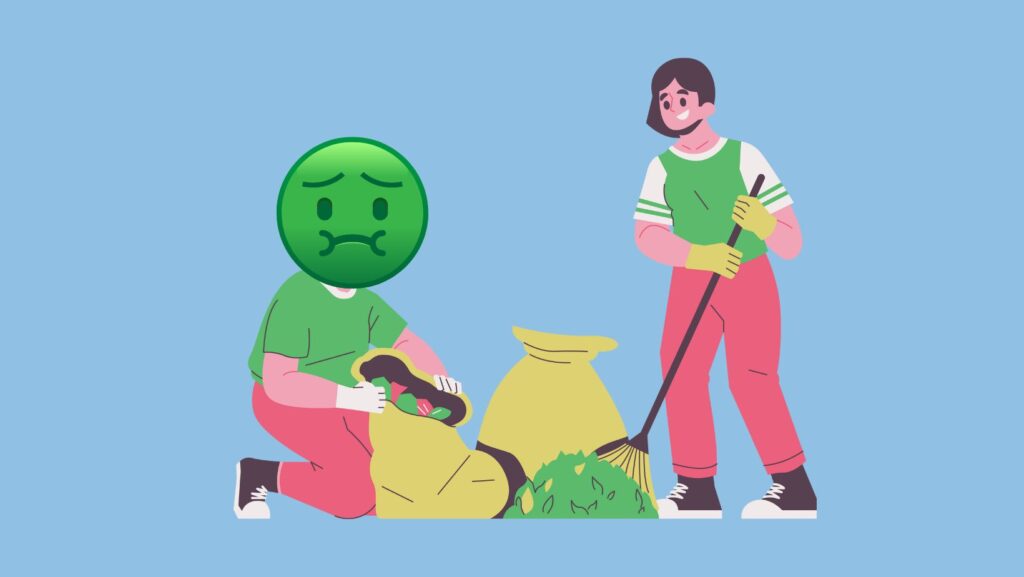
Cleaning up vomit is an unpleasant task, but it’s one that many people find themselves facing at some point in their lives. Whether it’s due to a sick family member, a pet, or a public space, cleaning up vomit can be a challenging and potentially hazardous task. One of the most common questions people ask is whether cleaning up vomit can make them sick. In this article, we will explore the various reasons why cleaning up vomit can be harmful, as well as the pros and cons of doing so.
The Dangers of Cleaning Up Vomit
There are several reasons why cleaning up vomit can be hazardous to your health. The first and most obvious is the risk of infection. Vomit contains a host of bacteria and viruses that can cause illness in humans. Some of the most common culprits include norovirus, rotavirus, and E. coli. These pathogens can be especially dangerous for young children, the elderly, and people with weakened immune systems.
Another danger of cleaning up vomit is exposure to toxic substances. In some cases, vomit may contain harmful chemicals or drugs that can be absorbed through the skin or inhaled. For example, if someone has ingested alcohol or drugs, their vomit may contain traces of these substances. In addition, if someone has been exposed to hazardous chemicals or substances at work, their vomit may pose a risk to those who come into contact with it.

What Diseases Does Vomit Carry?
Vomit can carry a range of bacteria and viruses, including:
- Norovirus: A highly contagious virus that causes vomiting and diarrhea.
- Rotavirus: Another highly contagious virus that causes vomiting and diarrhea, primarily in young children.
- Salmonella: A bacteria that causes food poisoning and can be found in vomit if the person has ingested contaminated food.
- E. coli: Another bacteria that can cause food poisoning and can be found in vomit.
- Hepatitis A: A virus that causes liver disease and can be transmitted through vomit if the person has the virus.
- Influenza: A highly contagious virus that can cause vomiting and other flu-like symptoms.
Pros and Cons of Cleaning Up Vomit
While there are certainly risks associated with cleaning up vomit, there are also some benefits to doing so. The primary benefit is that it can help prevent the spread of illness. By cleaning up vomit promptly and thoroughly, you can reduce the likelihood of others coming into contact with infectious agents. This is especially important in public spaces, where the risk of transmission is higher.
Another benefit of cleaning up vomit is that it can be a compassionate act. If someone in your family or a friend is sick, cleaning up their vomit can be a way to show them that you care. It can also help alleviate their discomfort and make them feel better. In some cases, cleaning up vomit can also be a way to prevent embarrassment or shame for the person who is sick.
On the other hand, there are certainly some drawbacks to cleaning up vomit. The most obvious is the risk of infection. If you don’t take proper precautions, you could end up getting sick yourself. This is especially true if you are cleaning up vomit from someone who has a highly contagious illness. In addition, cleaning up vomit can be emotionally and psychologically taxing, especially if you are dealing with a loved one who is very ill.

Precautions When Cleaning Up Vomit
If you do decide to clean up vomit, there are several precautions you should take to protect your health. The first is to wear protective clothing, such as gloves, a mask, and a gown or apron. This will help prevent you from coming into direct contact with the vomit or inhaling any harmful substances. You should also use a disinfectant to clean the area thoroughly, and be sure to dispose of any contaminated materials properly.
Another important precaution is to wash your hands thoroughly after cleaning up vomit. This will help remove any pathogens that may have come into contact with your skin. You should also avoid touching your face or mouth while cleaning up vomit, as this can increase the risk of infection.
Some FAQ’S Related To Vomit Exposure
- Can You Get Sick From Smelling Vomit?
Yes, smelling vomit can make you sick. The odor of vomit can be overpowering and unpleasant, and it can cause nausea and vomiting in some people. In addition, the fumes from vomit can contain harmful bacteria and viruses that can cause illness.
- Can You Get Sick From Vomit Fumes?
Yes, you can get sick from vomit fumes. When someone vomits, the fumes can contain bacteria and viruses that can cause illness if inhaled. These fumes can also cause irritation to the respiratory system, leading to coughing, wheezing, and other respiratory symptoms.
- Can You Catch A Virus From Vomit?
Yes, you can catch a virus from vomit. Many viruses, including norovirus and rotavirus, can be transmitted through vomit. These viruses are highly contagious and can cause severe gastrointestinal symptoms, including vomiting, diarrhea, and stomach cramps.
- Will I Get Sick If Someone Throws Up Near Me?
If someone throws up near you, there is a risk that you could get sick. Vomit contains a host of harmful bacteria and viruses that can cause illness if ingested or inhaled. It is important to take precautions, such as wearing gloves and a mask, and cleaning the area thoroughly to reduce the risk of infection.
- How Far Do Vomit Particles Travel? Is Vomiting Bug Airborne?
Vomit particles can travel several feet when someone vomits. The particles can become airborne and spread throughout a room, increasing the risk of infection for anyone in the vicinity. This is why it is important to take precautions, such as wearing a mask, when cleaning up vomit.
- How Long Is Norovirus Airborne After Vomiting?
Norovirus can remain airborne for several hours after someone vomits. The virus can also survive on surfaces for several days, increasing the risk of infection for anyone who comes into contact with contaminated surfaces. It is important to clean the area thoroughly with a disinfectant to reduce the risk of infection.
- How Long Is Vomit Contagious On Surfaces?
The length of time vomit remains contagious on surfaces depends on the type of virus or bacteria that caused the vomiting. In general, most viruses and bacteria that cause vomiting can survive on surfaces for several hours to several days. For example, the norovirus, a common cause of vomiting, can survive on surfaces for up to two weeks.
- Should I Clean Up Vomit Immediately?
Yes, it is important to clean up vomit immediately to prevent the spread of bacteria and viruses. Vomit can contain harmful pathogens that can survive on surfaces and cause illness. The longer vomit remains on a surface, the greater the risk of spreading illness.
How To Clean Up Vomit Without Vomiting? 7 Steps Guide
The Correct Way To Clean Up Vomit
- Wear protective clothing: Before you begin cleaning up vomit, make sure to protect yourself from coming into direct contact with it. Wear disposable gloves, a mask, and a gown or apron to prevent exposure to any harmful substances. It is also advisable to wear closed-toe shoes.
- Remove solid matter: Use paper towels or a plastic bag to remove as much of the solid matter as possible. Be careful not to spread the vomit around, and dispose of the materials in a plastic bag. Do not flush any of the materials down the toilet as this can cause blockages.
- Apply a disinfectant: After removing the solid matter, apply a disinfectant solution to the area to kill any bacteria or viruses that may be present. You can use a commercial disinfectant or a solution of water and bleach (one part bleach to nine parts water). Leave the solution on the affected area for at least 10 minutes to ensure that all the germs are killed.
- Clean the area: Use a clean cloth or mop to clean the area thoroughly. Be sure to cover all surfaces that were affected by the vomit, including floors, walls, and nearby objects. Rinse the area with clean water and dry it with a clean cloth or paper towel.
- Dispose of contaminated materials: Dispose of all materials that came into contact with the vomit, including gloves, masks, aprons, and cleaning cloths. Place all the materials in a plastic bag and tie it securely before disposing of it in the trash.
- Air out the room: If the odor of vomit is still lingering in the room, open the windows to allow fresh air to circulate. You can also use a fan or air purifier to help eliminate the odor.
- Take breaks: If you feel nauseous or dizzy while cleaning up vomit, take a break and step outside for some fresh air. Drink plenty of water and take deep breaths to help alleviate any feelings of nausea.
By following these steps, you can clean up vomit safely and effectively without feeling sick. Remember to always wear protective clothing and to dispose of contaminated materials properly to prevent the spread of germs.
By following these steps, you can clean up vomit safely and effectively to prevent the spread of illness.
Conclusion
In summary, cleaning up vomit can be hazardous to your health, but there are also benefits to doing so. While the risk of infection is certainly a concern, taking proper precautions can help minimize this risk. Ultimately, whether or not to clean up vomit is a personal decision that depends on the situation and the individual’s comfort level

Hi Everyone, BeYoungAholic’s aim is to help women who have lost their self-confidence because of the way they look. We will provide you tips and bits of advice on how to take care of yourself and maintain your youthful look. So, Enjoy the blog!
